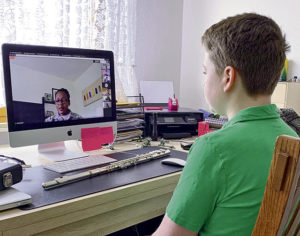Due to COVID-19, Department of Defense Education Activity Europe transitioned to a digital learning environment and after-school programs were cancelled.
Additionally, the U.S. Air Forces in Europe Band, the U.S. Army Europe Band and Chorus and U.S. Naval Forces Europe Band music outreach programs were cancelled as well.
“As military band units, we always want to find a way to give back to our roots in public school music programs,” said U.S. Air Force Tech. Sgt. Adam Porter, assistant director of operations, USAFE Band.
“With teaching in the military system, it is amazing to have a relationship with the military ensembles,” said Joel Helston, instrumental music teacher, Kaiserslautern High School. “In past years, they have provided performance opportunities as well as volunteering with our schools.”
With these relationships and previous experiences in mind and with the assistance of Ann Engels, DODEA Europe Fine Arts instructional systems specialist, Porter created a joint after-school virtual program where the European Command theater bands had the opportunity to mentor students and enhance instructional resources.

“Over the six-week life span of the program, I aligned class topics with teachers’ needs to make sure there was something for everyone,” said Porter.
In total, 33 service members from three EUCOM theater bands conducted a total of 98 classes for over 300 students from 30 schools in seven countries.
“This has been a great opportunity for our students to interact with professional musicians who specialize in their instrument,” said Engels.
“Having different bands lead the virtual classes was a great way to not only provide a variety of different teaching and styles, but also showed us [the students] that our passion for music doesn’t have to be limited to one performance group or style,” said Mackenzie Dillenbeck, a senior at Vilseck High School and daughter of Kristen Will, a DODEA math and music teacher.
Dillenbeck explained that a class would start with either recapping a previous class or introducing a new topic of focus. Then, the instructors would perform or demonstrate what they were discussing and volunteer students would do the same.
“I witnessed a lot of ‘see, try, do.’ We would demonstrate and students attempted the skill until both parties were satisfied,” said U.S. Army Sgt. Jamie DeLorme, an Army musician in the USAREUR Band and Chorus. “Watching a student truly ‘get’ something you’re trying to explain was the best part for me.”
“These experiences were no less than fantastic,” said Helston. “I know that these are some of the best musicians in the world and to provide students with an opportunity to learn from them was not only a great experience not only for my students but me also.”
For each of the EUCOM theater bands, typically when they teach masterclasses it is in person and in small groups. Due to COVID-19 restrictions, the after-school program marked the first time the musicians taught masterclasses virtually.
“Regardless of the masterclass, students were able to take something with them,” said Helston. “I can also say as a teacher, every class I hosted or attended was a learning experience. Some were reminders of the techniques I may have forgotten and others were skills or suggestions that I plan on incorporating in my curriculum when we come back to a traditional education setting.”
“The amazing thing about it is that students from all over DODEA Europe were able to log in to the same class,” said U.S. Navy Petty Officer 1st Class Katherine Kalinowski, NAVEUR band. “The number of schools that we’ve been able to reach is incredible.”
Students who attended the virtual classes came from all different music backgrounds and skill levels.
“It allowed students an opportunity to still have one-on-one instruction and face-to-face time with teachers and fellow students,” said DeLorme. “Students and teachers can perform for each other – we got to be each other’s audience. Who doesn’t love an audience?”
“Overall, the classes were a breath of fresh air from a typical day of meeting with my teacher online and then recording the music independently,” said Dillenbeck. “It was a great opportunity to interact with and learn from professionals in the music field while staying at home.”
In addition to the after-school program, the EUCOM bands also participated in a second program that primarily focused on resiliency, affectionately called “Brown Bag Sessions.” During lunch hours, students, teachers and families could tune in and listen to live music performed by the musicians.
“These sessions offered a brief respite to the week where the audience could log on and watch service members stationed in Europe perform,” said Porter. “It was great therapy for all, not only for the audience members, but also the musicians.”
As the end of the 2019-2020 school year draws to a close, the joint virtual program will end as well with a final performance from a joint band comprised of musicians from USAFE, USAREUR and NAVEUR bands to celebrate the work of the students, faculty and the graduating class of 2020.
Engels wished to thank the musicians and DODEA teachers who helped coordinate the program.
“It was a pleasure working with colleagues from the Air Force and Navy as well as with students themselves,” said DeLorme. “There are a lot of truly talented individuals spread out throughout the joint forces, and it was an honor to work among them.”
“This has been an incredible opportunity to work in partnership with our brother and sisters in the Air Force and Army as well as DODEA teachers to bring music education to DODEA students during this challenging time,” said Kalinowski. “It’s been a privilege to be a part of this initiative.”


